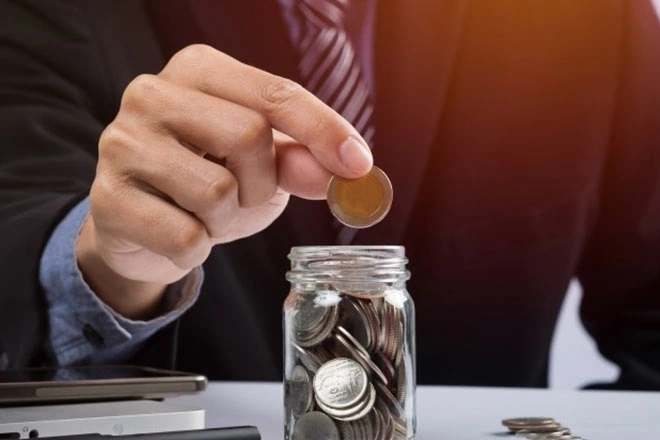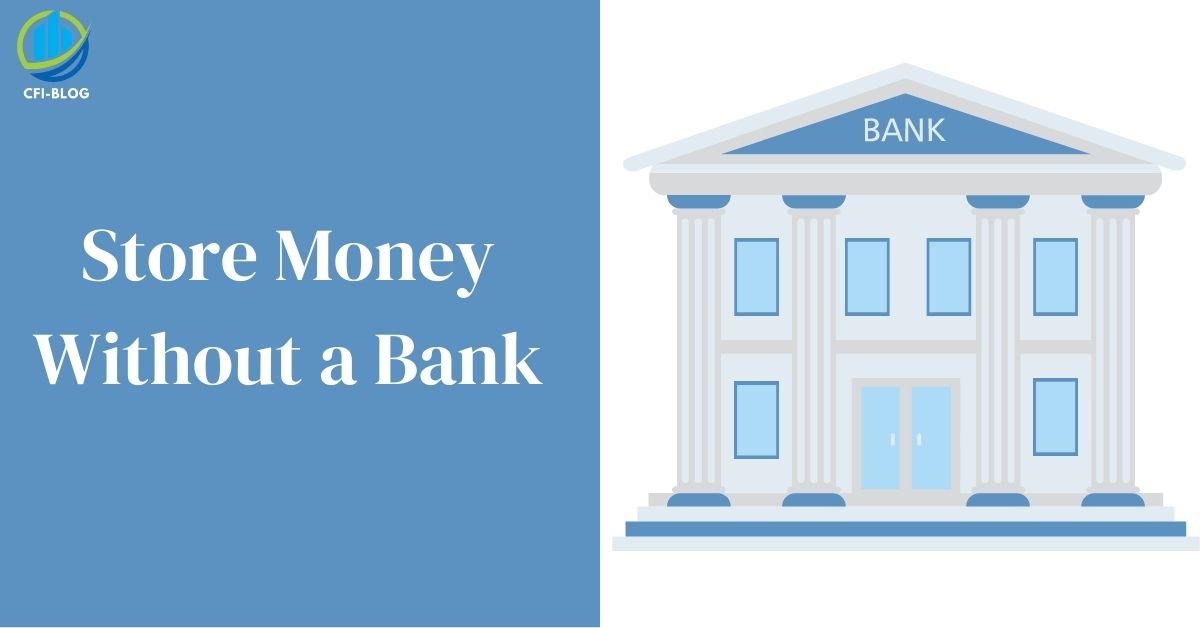Are you someone who does not have a bank account? Do you want to know how to store money without a bank account? These days, most people believe in keeping their money in bank accounts. But it is always a good idea to have some cash in hand so that you can use the money whenever your bank is facing some technical issue.
Moreover, various shops and merchants do not accept online payments and transactions, or if you are facing network issues or are traveling to a new place and do not have a stable internet connection then it can get very difficult for you to make online payments. So, it is always a good idea to carry some cash.
In this article, we are going to tell you about the best ways to store money without a bank. We will also tell you about the advantages and disadvantages of not keeping your money in the bank. So if you want to know how to store money without a bank, then keep reading!
How to Store Money Without a Bank?

Mostly, people keep most of their money in their bank accounts only. As per a survey by Unbanked and Underbanked Households, 4.5% of the people still do not have bank accounts. So if you do not have a bank account or do not want to keep all your money in your bank account then you can use any of the following options as well.
1. Store the Money in Your Home
If you are wondering how to store money without a bank account then you can store your money in your home as well. You can keep the cash at some safe and secret places in your home. But if you decide you keep the money in your home, you will have to take care of a few things like not keeping all the cash in one place, using safe and fireproof lockers to store cash, etc.
You can also use secret lockers that do not actually look like a locker but have a lot of space to store the money. This way, you would be able to distract people from knowing where you keep the cash in your money. It is the best way to store cash.
2. Use a Prepaid Debit Card
In case the bank is not an option for you, you can also use prepaid debit cards to store your money. You can deposit your money in the credit card company and they will offer you a debit card that contains your money. Then you can easily use this credit card to make online transactions or just swipe it at any store to make the payment.
But make sure that you do not store all your money in your debit card, because if you lose your debit card or someone else ends up using all your funds then you would be left with no money at all. So prepaid debit cards are definitely convenient, but it is also important to keep some of your money somewhere else as well.
Also, you can use these debit cards to withdraw hard cash from any ATM. If you do not want to keep the hard cash then you can get multiple prepaid debit cards to keep your money at different places.
3. Invest in Assets
If you do not want to keep the cash then you can use that cash to buy valuable items. But if you decide to invest in assets then make sure that you only purchase those items whose value would only raise in the future. You can purchase things like gold, silver, diamond, etc. You can also buy other auctionable things that would be of a higher price in the future.
Avoid purchasing things like cars, electronic gadgets, mobile phones, etc. with the purpose of investment. Because with time, the prices of these things decrease.
4. Alternatives of Bank Accounts
Looking for how to store money without a bank? Do not worry! If you do not have a bank account or do not want to store all your money in the bank account then you can go with other online platforms like Cash App or Chime that allow you to open an online account with them and store all your money there.
But before going for this option, make sure that you check the ratings and reviews of the platform you are going for so that you can get to know if they are genuine or not. Because if you are not cautious, you can end up losing all your money by depositing it into some fraudulent online platform.
5. Invest in Real Estate

You can also invest in real estate. If you have enough money then you can also invest that money in real estate. Because it is one of those fields where the value of the asset only goes higher. So if you are looking for the best way to store money then investing in real estate can definitely be one. Also, if you are a school or college student, you can use budgeting apps for teens to keep a track of your spending.
6. Stocks, Cryptocurrencies, and Mutual Funds
Investing in stocks, cryptocurrencies, and mutual funds is the best way to store cash and build wealth over the long term. Each has its own set of risks and potential rewards. Before investing in any of these options, it’s important to do your research and consult with a financial advisor to determine the best strategy for your specific financial situation and goals. It’s also important to have a long-term perspective and not make investment decisions based on short-term market fluctuations.
How to Store Cash At Home?
Storing cash at home can be risky, but if you choose to do so, here are some tips for keeping it safe:
1. Use a Secure location
Choose a secure location in your home, such as a safe or a locked cabinet, to store your cash. Make sure the location is dry, free from pests, and easily accessible to you but not to others.
2. Keep the Cash Organized
Sort and organize your cash in a way that makes it easy to count and access when needed. Consider using currency straps or envelopes to keep the cash organized. Otherwise, you can lose track of the money that you have and the money that you spend.
3. Use a Fireproof Safe
Consider investing in a fireproof safe to protect your cash from fire or other disasters. Place the safe in a discreet location in your home. So that if a fire breaks in your house, your money can be safe.
4. Use Diversion Safes
Consider using a diversion safe, which is an everyday object like a book or a can, with a hidden compartment for storing cash. This can help to keep your cash hidden from potential thieves.
5. Do Not Store All Your Cash in One Place
Consider spreading your cash out among different locations to minimize the risk of losing it all at once. For example, you could store some cash in a safe, some in a diversion safe, and some in a hidden location in your home.
6. Keep Your Home Secure
Make sure your home is secure by locking all doors and windows and installing a security system if possible. This can help to deter potential thieves from targeting your home.
7. Keep the Cash Out of Sight
Avoid leaving cash in plain sight where it can be easily spotted by visitors or burglars. Keep it hidden in a secure location. You can also use secret lockers to keep the money out of sight of the people.
How to Store Money Online Without a Bank Account?
Are you looking for how to store money without a bank but you only want to store the money online? Do not worry, in this section, we are going to tell you about the best way to store money online. Let’s have a look at our options:
1. E-wallets
E-wallets are online platforms that allow you to store money and make payments. Popular e-wallets include PayPal, Skrill, and Payoneer. You can fund your e-wallet using a credit or debit card, and some e-wallets also allow you to receive payments. Moreover, you can also go with platforms like Chime or Cash App.
2. Prepaid Cards
Prepaid cards are similar to debit cards, but you don’t need a bank account to use them. You can load money onto the card using cash or a credit card, and then use the card to make purchases or withdraw cash from ATMs.
3. Cryptocurrencies
Cryptocurrencies like Bitcoin and Ethereum can be used to store value online. You can buy and sell cryptocurrencies on cryptocurrency exchanges, and some businesses also accept cryptocurrencies as payment.
How to Store Cash long-term?
If you are looking for a long-term option to store your money, then it is better to go to a bank. Because banks provide complete safety and security to your money along with the insurance that even if you lose the money because of the bank’s fault, you will get your money back. But if you do not want to move ahead with the bank then you can go with any of the following best ways to store cash at home:
- Invest in valuable assets like gold, silver, and diamond.
- Invest in real estate.
- Go with other investment options like stocks, NFTs, cryptocurrencies, mutual funds, etc.
Benefits of Not Keeping the Money in Your Bank Account
Now that you know how to store money without a bank, let’s have a look at the benefits of not keeping the money in the bank so that you can make a wise decision with your money. Here are some potential advantages:
1. No Bank Fees
The best and most important benefit of not keeping your money in a bank account is, you do not need to pay bank fees. Most banks come with a high amount of fees like account maintenance fees, security fees, interest fees, debit card fees, etc. But by not using a bank account, you can avoid fees associated with account maintenance, overdrafts, or ATM withdrawals.
2. Anonymity
Depending on how you store your money, it can be more difficult to trace your financial transactions, providing more privacy and anonymity. Because when it comes to banks, they keep a record of every transaction that you make, no matter how small the transaction is.
3. Access to Cash
If you store your money in cash, you have immediate access to your funds and don’t have to worry about waiting for bank transfers or clearance times. When it comes to banks, the transactions can take a lot of time if your bank is facing any technical or network issues. Plus, if you do not have a debit card associated with your bank account, you will have to run to the bank every time you need some cash.
4. No Minimum Balance Requirements
Banks often require a minimum balance to avoid fees or qualify for certain benefits. By not using a bank, you can avoid these requirements.
Risks of Not Keeping the Money in a Bank
As per the 2021 FDIC National Survey of Unbanked and Underbanked Households, 81.5% of people in America keep their money in banks. There are several reasons for it including security. Not keeping your money in the bank can be risky, here are some of the risks:
1. Security Risks
Keeping money outside of a bank can be risky, as there is a greater risk of loss, theft, or damage. Banks have security measures in place to protect your deposits, such as insurance and encryption.
2. No FDIC Insurance
The Federal Deposit Insurance Corporation (FDIC) provides insurance for deposits at banks, protecting them up to a certain amount in case the bank fails. Money kept outside of a bank is not FDIC-insured and is at greater risk of loss.
3. Limited Financial Services
Banks offer a wide range of financial services, such as loans, credit cards, and mortgages. By not using a bank, you may not have access to these services or may have to pay higher fees for similar services from other providers. Moreover, banks also offer interest on the money that you deposit, so if you are looking for money-saving tips then you can open a savings account in a bank that offers a high interest.
4. Difficulty with Large Transactions
If you need to make a large purchase or transfer a significant amount of money, it can be more difficult to do so without the infrastructure of a bank.
5. Limited Transaction Records
Without a bank account, it can be harder to keep track of your financial transactions, which can make it more difficult to budget and plan for the future.
6. Difficulty with International Transactions
If you need to make international transactions, banks can provide services such as currency exchange and international wire transfers. Without a bank, it can be more difficult to navigate international transactions.
Frequently Asked Questions (FAQs)
Q1. Where is the safest place to keep your money besides a bank?
If you do not want to store your money in a bank then you can also keep your money in your home, store it online or invest it. Moreover, you can use things like money affirmations to increase your wealth.
Q2. What is the best way to store cash money?
One of the best ways to store cash is in banks. Because banks keep your money safe and protected. There are very less chances of robbery, plus you also get insurance and interest on the money that you store. Also, you can also open a bank savings account that offers you high interest.
Q3. Can I keep money at home instead of the bank?
Yes, you can definitely keep the money at home. If you are wondering how to store money at home, you need to take care of a few things, like, do not keep all your cash in one place, using fireproof lockers, etc.
Q4. How to store money in a safe place?
If you want to store money in a safe place then it is better to go with a bank. But if you want to store money at your home only then you can use things like secret lockers so that your money does not grab the attention of visitors.
Should I Keep the Money in a Bank or Not?
It should be totally your personal choice if you want to store the money in the bank or not. If you are looking for how to store money without a bank then you can go with options like keeping the money in your home, using an e-wallet, or prepaid debit card, or investing your money in assets or real estate.
But you need to remember that storing cash at home comes with risks, and it’s always a good idea to consider alternative methods of storing your money, such as using a bank or investing in other assets. If you must store cash at home, take appropriate precautions to keep it safe.
All in all, while there may be some advantages to not keeping money in a bank, the risks and disadvantages often outweigh the benefits. It’s important to carefully consider your options and choose a storage method that fits your financial needs and circumstances.
Author Profile

- David Garcia is a nationally-recognized consumer and money-saving expert who helps people make smart decisions with their money. He has been featured on NBC’s Today Show, Good Morning America, ABC News, and CNBC as well as in The New York Times & other media outlets. With more than 13 years of experience in the personal finance space, David is an experienced writer and researcher. He has written for major publications where he provides readers with actionable advice to save money on groceries, insurance, and more. With his work for various publications, David is an active contributor to the Credit Card Insider blog where he shares insights into credit cards such as rewards programs and interest rates.
Latest entries
 Loan App ReviewsApril 30, 20235K Funds Review: Analysis of the Online Loan Platform
Loan App ReviewsApril 30, 20235K Funds Review: Analysis of the Online Loan Platform BlogApril 30, 2023Top 5 Cheapest States to Live In 2024: A Comprehensive Guide
BlogApril 30, 2023Top 5 Cheapest States to Live In 2024: A Comprehensive Guide BlogMarch 21, 2023How Much is 6 Figures? How to Make a 6 Figure Salary?
BlogMarch 21, 2023How Much is 6 Figures? How to Make a 6 Figure Salary? BlogMarch 20, 2023What is Chime Spot Me? Features, How to Use & More
BlogMarch 20, 2023What is Chime Spot Me? Features, How to Use & More

